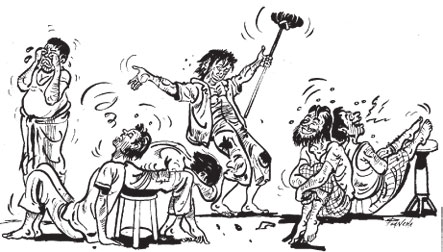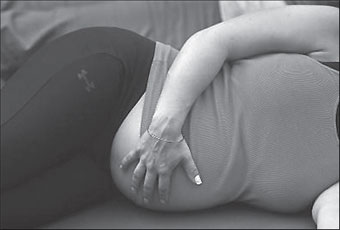|

Psychiatric patients get stepmotherly treatment
by Dr. Jegapathy Rajendra
The challenges of psychiatry are common to all the countries.
However, the difference lies in the funding and staffing in the
healthcare sector. What is more, funding is directly related to
staffing.
According to the World Health Organisation (WHO) nearly 26 percent of
the population in the United States suffer from mental illnesses.
One out of five people experiences mental illnesses in his lifetime.
This is nearly 20 percent of the population in developed countries.
 The ratio may be slightly higher in developing countries. About 20
percent of the mentally ill people are substance abusers. Out of the 20
percent of mentally ill people, one percent suffer from schizophrenia,
seven percent from depression and 12 percent from anxiety disorder.On
most occasions mental illnesses begin in childhood and adolescence. As a
result, mental illnesses adversely affect society. It has been estimated
that more females suffer from mental illnesses than males. The ratio may be slightly higher in developing countries. About 20
percent of the mentally ill people are substance abusers. Out of the 20
percent of mentally ill people, one percent suffer from schizophrenia,
seven percent from depression and 12 percent from anxiety disorder.On
most occasions mental illnesses begin in childhood and adolescence. As a
result, mental illnesses adversely affect society. It has been estimated
that more females suffer from mental illnesses than males.
Death
In both developed and developing countries, mental illnesses are the
second highest cause of disability and death. What is more, those who
suffer from mental illnesses frequently get absent from work. As a
result, the economy at the country suffers.
Canada spends 51 billion dollars to look after mentally distressed
people. The Canadian Government has found that it is not sufficient to
deal with the mounting number of mental patients.
The situation in some Asian countries is even worse. For instance,
India needs 150,000 psychiatrists to treat mentally ill patients.
However, the Indian subcontinent has only 3,000 psychiatrists.
Nearly 10 percent of the population in Japan suffer from psychiatric
disorders. While Japanese are the largest consumers of anxiety related
drugs in the world, Japan has the highest number of suicides compared to
other countries.
Although mental illnesses remain a major problem in the world, WHO
statistics shows that 72 percent of the population are worried about
cancer. Another 68 percent of the population is more concerned with
diabetes than mental illnesses.
Only about 50 percent of the people are worried about mental
illnesses. Mental illnesses have led to other problems. For instance, 49
percent of the people equate mental illnesses with bad behaviour.
To add insult to injury, 51 percent of the people do not socialise
with mentally ill patients.
When there is a large number of mentally ill people in a given
society, it can lead to more crimes being committed. Any increase in
crimes can have a domino effect. When there are more criminals in a
country we need more prisons.
Mobile Intervention Teams
In developed countries there are Mobile Intervention Teams to prevent
people from committing suicide. Police and hospital staff are also kept
on the alert to prevent suicides. Social workers visit mental patients
every week. When patients do not visit the hospital for treatment,
social workers bring them to hospital.
The commonest mental illness is depression. There are two types of
depression. The unipolar depression is only depression. However, a
person suffering from bipolar depression will have depression and high
or low moods.
It is estimated that 29 percent of bipolar sufferers end up in
committing suicide. Here again the females outnumber the males.
Treatment
The treatment of mental illnesses has been hampered by the lack of
funding for research in psychiatry. Most governments allocated funds
lavishly for other diseases but psychiatry remains a neglected area.
There are certain limitations on drug treatment of mental patients.
As far as other diseases are concerned, most drugs act specifically, on
the right target with less side effects.
However, any treatment of depression has to take into account
frequent changes of mood of the patient, his lack of interest, loss of
energy and loss of appetite.
Unknown to most of us, nearly 3,000 people suffering from mental
illness, commit suicide every day.
To combat the mounting number of mentally depressed people, we need
psycho-social support at every stage. Anti-depressants can have side
effects on patients.
Our thoughts, words and actions are interconnected. If you have
positive thoughts, you will enjoy life. If you have negative thoughts,
you court disaster. You can learn from your past, but you must not live
in the past. It is always advisable to live in the present.
The writer is Deputy Chief of Psychiatry, Scarborough Grace
Hospitals, Canada. He delivered the keynote address on the above topic
at a seminar organised by Ballarat University Campus, Colombo recently.
Blood pressure during pregnancy may affect offspring's health
Up to 10 percent of all women experience some form of elevated blood
pressure during pregnancy.
Researchers from the Centre for Social Evolution at the Department of
Biology, University of Copenhagen show that mild maternal hypertension
early in pregnancy actually benefits the foetus, but that late-pregnancy
hypertension has negative health consequences for the child.
The study is based on more than 750,000 births in Denmark, with
follow-up data on children's hospital diagnoses for up to 27 years.
 'It has been known for some time now that pregnancy-induced
hypertension can lead to more serious toxic conditions (preeclampsia),
but it has puzzled biologists why such a medical condition that can be
quite dangerous for both mother and child has not previously been
removed by natural selection in our stone-age ancestors. 'It has been known for some time now that pregnancy-induced
hypertension can lead to more serious toxic conditions (preeclampsia),
but it has puzzled biologists why such a medical condition that can be
quite dangerous for both mother and child has not previously been
removed by natural selection in our stone-age ancestors.
Evolutionary theory
However, evolutionary theory also emphasises that paradoxes of this
kind can be due to genetic parent-offspring conflicts, so we set out to
test whether we could find statistical evidence for that type of
explanation', says Prof Jacobus Boomsma, Director of the Centre for
Social Evolution and coordinator of the study.
The results clearly indicate that mothers with minor increases in
blood pressure in the first trimester of pregnancy have babies that
enjoy generally better health than children of mothers who never get a
hypertension diagnosis during pregnancy. The difference was between 10
and 40 percent fewer diagnoses across all disease categories during the
27 years of available follow-up data, a result that has never been
documented before.
Increased risk
However, when hypertension continues or starts later in pregnancy,
this advantage shifts to a ca. 10 percent disadvantage in terms of an
increased risk of acquiring a diagnosis in the Danish public health data
bases.
Child mortality during the first year of life showed the same trend.
In spite of this risk being very low in Denmark, no children of
mothers with early pregnancy-induced hypertension died, whereas the
mortality risk of children born to mothers with hypertension late in
pregnancy was above average.
Parent-offspring-conflict theory maintains that father-genes in the
placenta will have a tendency to 'demand' a somewhat higher level of
nutrition for the foetus than serves the interests of mother-genes. It
argues that father genes that somehow manage to enhance maternal blood
pressure will likely be met by maternal genes compensating this
challenge. Both types of genes are 50/50 represented and thus likely to
find a 'negotiated' balance while creating an optimally functioning
placenta. However, when the pull of paternal genes cannot quite be
managed by maternal counterbalances, there is a risk of elevated blood
pressure to develop and persist, leading to late occurring pregnancy
complications and compromised offspring health.
The results obtained are consistent with the idea that some deep
fundamental conflicts lay buried in our genes right from the moment of
conception. Imprinted genes are prime suspects for mediating such
conflicts as they 'remember' which parent they come from. 'Molecular
biologists have recently found many such genes in mice and man, and they
are particularly expressed in the placenta as the theory predicts.
Our study therefore suggests that further research to test whether
different patterns of pregnancy-induced hypertension are indeed related
to paternal or maternal imprints would be highly worthwhile', said PhD
student Birgitte Hollegaard, who did the analyses together with EU Marie
Curie Post-doctoral Fellow Sean Byars.
The authors of the study hope these results will help build bridges
between their evolutionary inspired public health analyses and
established clinical praxis.'Ultimately we are not only interested in
the fundamental science aspects of genome level reproductive conflicts,
but also in seeing some of these findings being made more directly
useful, for example by adjusting pregnancy monitoring schemes to take
long term risks for offspring health into account', said Jacobus
Boomsma.
- MNT
Eating too much? Maybe it's in the blood
Bone marrow cells that produce brain-derived eurotrophic factor
(BDNF), known to affect regulation of food intake, travel to part of the
hypothalamus in the brain where they "fine-tune" appetite, said
researchers from Japan, in a report that appears in Nature
Communications.
"We knew that blood cells produced BDNF," said Dr. Lawrence Chan,
prof of molecular and cellular biology and professor and chief of the
division of diabetes, endocrinology; metabolism in the department of
medicine. The factor is produced in the brain and in nerve cells as
well. "We didn't know why it was produced in blood cells."
 Dr. Hiroshi Urabe and Dr. Hideto Kojima, looked for BDNF in the
brains of mice who had not been fed for about 24 hours. The bone
marrow-derived cells had been marked with a fluorescent protein that
showed up on microscopy. To their surprise, they found cells producing
BDNF in a part of the brain's hypothalamus called the para-ventricular
nucleus. "We knew that in embryonic development, some blood cells do go
to the brain and become microglial cells," said Chan. (Microglial cells
form part of the supporting structure of the central nervous system.
They are characterised by a nucleus from which "branches" expand in all
directions.) "This is the first time we have shown that this happens in
adulthood. Blood cells can go to one part of the brain and become
physically changed to become microglial-like cells." Dr. Hiroshi Urabe and Dr. Hideto Kojima, looked for BDNF in the
brains of mice who had not been fed for about 24 hours. The bone
marrow-derived cells had been marked with a fluorescent protein that
showed up on microscopy. To their surprise, they found cells producing
BDNF in a part of the brain's hypothalamus called the para-ventricular
nucleus. "We knew that in embryonic development, some blood cells do go
to the brain and become microglial cells," said Chan. (Microglial cells
form part of the supporting structure of the central nervous system.
They are characterised by a nucleus from which "branches" expand in all
directions.) "This is the first time we have shown that this happens in
adulthood. Blood cells can go to one part of the brain and become
physically changed to become microglial-like cells."
However, these bone marrow cells produce a bone marrow-specific
variant of BDNF, one that is different from that produced by the regular
microglial cells already in the hypothalamus.
Only a few of these blood-derived cells actually reach the
hypothalamus, said Chan. "It's not very impressive if you look casually
under the microscope," he said. However, a careful scrutiny showed that
the branching nature of these cells allow them to come into contact with
a whole host of brain cells.
"Their effects are amplified," said Chan. Mice that are born lacking
the ability to produce blood cells that make BDNF overeat, become obese
and develop insulin resistance (a lack of response to insulin that
affects the ability to metabolise glucose). A bone marrow transplant
that restores the gene for making the cells that produce BDNF can
normalise appetite, said Chan. However, a transplant of bone marrow that
does not contain this gene does not reverse overeating, obesity insulin
resistance. When normal bone marrow cells that produce BDNF are injected
into the third ventricle (a fluid-filled cavity in the brain) of mice
that lack BDNF, they no longer have the urge to overeat, said Chan.All
in all, the studies represent a new mechanism by which these bone-marrow
derived cells control feeding through BDNF and could provide a new
avenue to attack obesity, said Chan.
- medicalxpress
Preventing chronic pain with stress management
For chronic pain sufferers, such as people who develop back pain
after a car accident, avoiding the harmful effects of stress may be key
to managing their condition. This is particularly important for people
with a smaller-than-average hippo-campus, as these individuals seem to
be particularly vulnerable to stress.
These are the findings of a study by Dr. Pierre Rainville, Professor
in the Faculty of Dentistry at Université de Montréal, along with
Étienne Vachon-Presseau, a student in Neuropsychology.
 The study appeared in Brain, a journal published by Oxford University
Press. "Cortisol, a hormone produced by the adrenal glands, is sometimes
called the 'stress hormone' as it is activated in reaction to stress. The study appeared in Brain, a journal published by Oxford University
Press. "Cortisol, a hormone produced by the adrenal glands, is sometimes
called the 'stress hormone' as it is activated in reaction to stress.
Our study shows that a small hippocampal volume is associated with
higher cortisol levels, which lead to increased vulnerability to pain
and could increase the risk of developing pain chronicity," said Étienne
Vachon-Presseau.
As Dr. Pierre Rainville said, "Our research sheds more light on the
neurobiological mechanisms of this important relationship between stress
and pain. Whether the result of an accident, illness or surgery, pain is
often associated with high levels of stress Our findings are useful in
that they open up avenues for people who suffer from pain to find
treatments that may decrease its impact and perhaps even prevent
chronicity. To complement their medical treatment, pain sufferers can
also work on their stress management and fear of pain by getting help
from a psychologist and trying relaxation or meditation techniques."
This study included 16 patients with chronic back pain and a control
group of 18 healthy subjects. The goal was to analyse the relationships
between four factors: 1) cortisol levels, which were determined with
saliva samples; 2) the assessment of clinical pain reported by patients
prior to their brain scan (self-perception of pain); 3) hippocampal
volumes measured with anatomical magnetic resonance imaging (MRI); and
4) brain activations assessed with functional MRI (f MRI) following
thermal pain stimulations. The results showed that patients with chronic
pain generally have higher cortisol levels than healthy individuals.
- MNT
AIDS impairs the ability to recognise emotions in others
 People with HIV are less able to recognise facial emotion than
non-infected people says a study published in BMC Psychology. Reduction
in their ability to recognise fear in others is linked to a similar loss
in immediate recall, while those with a lower general neurocognitive
performance also had a reduced ability to recognise happiness. People with HIV are less able to recognise facial emotion than
non-infected people says a study published in BMC Psychology. Reduction
in their ability to recognise fear in others is linked to a similar loss
in immediate recall, while those with a lower general neurocognitive
performance also had a reduced ability to recognise happiness.
The mechanism behind recognition of facial emotion is complex,
involving many different areas of the brain, including the
frontostriatal pathway and amygdala. The frontostriatal pathway is
essential for learning and behavioural adaption, while the amygdale is
involved in memory and emotion. The loss of this ability can be
debilitating, impacting daily life and personal interactions.
Comparing people with HIV to a control group without HIV, researchers
in Rome discovered that from the six basic expressions of emotion
(disgust, anger, fear, happiness, surprise, sadness) that fear is the
most difficult emotion to recognise. People with HIV were less accurate
in identifying fearful expressions than the controls and also tended to
have difficulties in immediate recall of words indicating a link between
the two. People with a higher number of AIDS-related events, such as
pneumonia, Kaposi's sarcoma, or tuberculosis, and people with
neurocognitive problems in memory, attention and decision making,
language and speed of mental processing, were less able torecognise
happiness in others. Dr Eleonora Baldonero, who led the study commented,
"The severity of HIV-associated neurocognitive disorders has been
significantly reduced thanks to combination antiretroviral therapy.
Nevertheless our research highlights a link between cognition and facial
recognition and that AIDS-related events affect both. Understanding this
on a individual level can help the long-term personal management of
HIV."
- MNT
|



